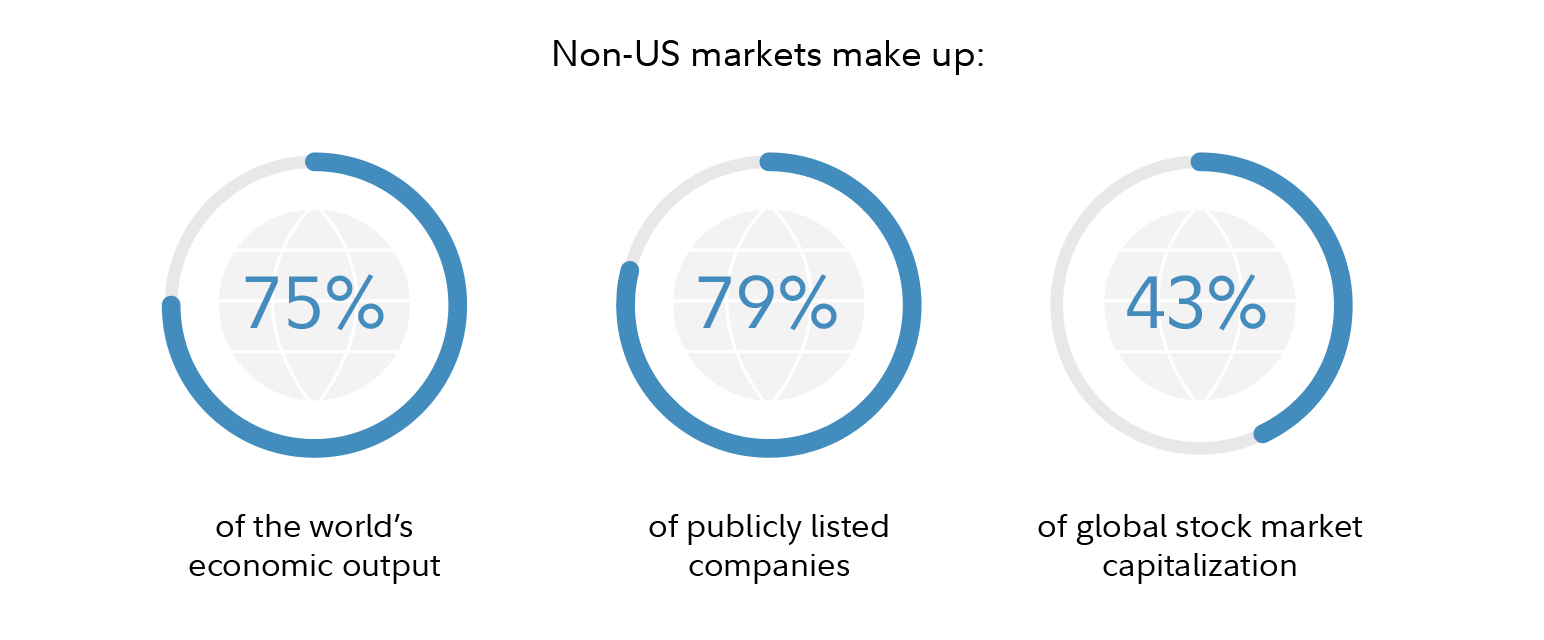Over the last few years, US stocks have experienced stronger gains than international stocks. This has led some investors to focus primarily on US stocks for their investments.
However, looking ahead, investors may want to consider adding some exposure to international stocks, says Naveen Malwal, institutional portfolio manager with Strategic Advisers, LLC, the portfolio investment team for many managed account clients at Fidelity. “Fidelity's Asset Allocation Research Team (AART) expects international stocks to potentially outperform US stocks over the next 20 years,“ he says. “But beyond the potential for healthy returns from international stocks, they can also help provide smoother returns for US-based investors.”
Here are 3 key reasons to consider international stocks for your portfolio.
Home-country bias can limit investment options
Many US investors tend to favor investing in US stocks, a phenomenon known as home-country bias. Part of the reason is the human tendency to prefer the familiar, in all parts of life. By default, we tend to choose the foods we grew up with, buy brands we've purchased before, and hang out with people we already know. In investing, that usually means sticking with companies we've heard of—maybe even one you or your family has worked for. "But whether you know of or use a company's products has virtually no bearing on the future performance of its stock," says Malwal.
In addition, some investors may wish to steer clear of certain countries because of political concerns or issues with market transparency. However, "international portfolio managers think about global businesses with worldwide revenues," says Malwal. "So international investing doesn't have to mean a positive outlook on governments or the economies of a given country. Rather, it's about looking at specific business opportunities that happen to be headquartered outside of the US."
In fact, many popular goods or brands that are familiar to US households are headquartered overseas. Within developed markets, this could include cars from German auto companies, luxury goods from France or Italy, medicine from Swiss pharmaceuticals, or coats and yoga pants from Canadian clothing brands. Meanwhile, popular goods or brands in emerging markets could include phone and high-end electronics manufacturers in Asia, food companies from Central and South America, or energy producers in the Middle East.
Home-country bias can limit your investment opportunities

International exposure can help mitigate volatility
Because US stocks have outpaced international stocks over the last few years, many investors may believe that non-US equities tend to underperform compared to their US counterparts. Historically, that hasn't always been the case.
Over the past 2 decades, there have been calendar years in which international stocks have outperformed US stocks and vice versa. Long term, however, the returns on a globally balanced and US-only portfolio have been similar. Between 1950 and 2022, a hypothetical, globally balanced portfolio made up of 70% US stocks and 30% international stocks would have returned an annualized 11.1%, almost matching the returns on a hypothetical portfolio invested solely in US stocks, which would have returned an annualized 11.2%.
But here's how international stocks helped: In this hypothetical example, the globally balanced portfolio had a lower standard deviation, a widely accepted measure of volatility.1 "This shows how a 70/30 portfolio could potentially provide strong return potential with less volatility than a 100% US stock portfolio," Malwal says.
US multinational exposure may provide limited benefits
Some investors may also believe that investing in US multinational companies can provide adequate exposure to international markets. They may point to the fact that about a third of S&P 500 revenue comes from overseas2—what is known as the pass-through effect. But according to Malwal, there's only so much international exposure one can get by investing in multinationals. "For example, if there's an economic boom happening in some countries, those local businesses are more likely to directly benefit from that than a US-based company with some foreign earnings exposure," he says.
In tumultuous times, international investments can offer exposure to companies that may be affected differently by geopolitical situations. For example, higher commodity prices often create headwinds for US stocks. But non-US commodity producers have generally seen their revenues soar when commodity prices are high. These companies rely on selling energy, metals, or agricultural products (food and fertilizers) for their earnings. "Even in 2022, which was a volatile year for stocks, international portfolio managers found opportunities to add exposure to stocks that had earnings growth potential," Malwal says.
International portfolio managers can help balance risk and long-term returns
Given the breadth of investing opportunities in a global world, international investing can seem daunting, especially since exposure to foreign currency movements or geopolitical developments are part of international investing. This makes both careful security selection and diversification within portfolios important for spotting opportunity while seeking to avoid undue risk, Malwal suggests. With those factors in place, some exposure to international stocks may help investors reach their financial goals. "The world population continues to grow and more people are moving up from poverty to the middle class," Malwal says, "so global corporate earnings are likely to head higher over time. Historically, corporate earnings growth has led to rising stock prices. That's why I believe international stocks can be an important part of a well-diversified portfolio."


